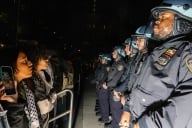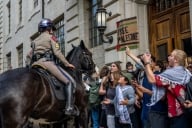You have /5 articles left.
Sign up for a free account or log in.

Ausra Barysiene vaizdai
Last month, the University of Pennsylvania hosted Palestine Writes, a literary conference that featured some speakers who were very critical of Israel, including Roger Waters, formerly of Pink Floyd, whose anti-Israel comments are seen by many as antisemitic. Jewish groups objected, but Penn president M. Elizabeth Magill decided that, while some of the participants had track records of “engaging in antisemitism,” the conference should go forward because Penn supports “the free exchange of ideas as central to our educational mission.”
This conflict, which puts two noble goals in opposition—the fight against antisemitism and the commitment to free speech—has been replicated in a number of ways at different colleges, and there’s every reason to think such conflicts will increase and intensify with Israel and Hamas at war. Among the recent campus flash points, several Jewish groups and a congressman objected to a Princeton University syllabus including a book that accused Israel of deliberately maiming Palestinians; they demanded, futilely, that the text be dropped. At the University of California, Berkeley, nine student groups voted to not allow speakers, no matter what the topic or their expertise, if they were Zionists, a stance that Berkeley Law dean Erwin Chemerinsky declared antisemitic while also allowing “that law student groups have free speech rights, including to express messages that I and others might find offensive.”
As president of American Jewish University and former president and CEO of the Newseum, a museum dedicated to the First Amendment and a free press, as well as a former president of Colgate University, an institution that celebrated the ability of a liberal arts education to prepare students to probe and understand controversy, I have watched these conflicts with a growing sense of concern.
In all three cases, the university leaders came to the right conclusion: adhering to the norms of free expression despite the hurt caused by antisemitism. University leaders should not limit expression or association unless there is a reasonable fear that physical harm might come to those on campus. Any other policy risks inhibiting free inquiry, and the free organization of student groups, as people struggle to make sense of ever-changing norms, governed by real or perceived hurt feelings, or by the political agendas of those who want to silence certain speakers.
Jews, as an increasingly beleaguered minority on campus, have an interest in free expression being protected, because restrictions on speech, no matter how well intentioned, eventually boomerang on those who are weak. If you want the Israeli prime minister, whether it is Benjamin Netanyahu or anyone else, to be able to speak on campus, the litmus test cannot be a lack of hurt feelings, because there will be many who will argue they are pained by any appearance of an Israeli leader.
At the same time, it was unfortunate that tougher questions were not asked during these controversies that go beyond adhering to the norm of free expression.
The first issue to be probed more deeply is to ask if those who are rightfully exercising their rights of free expression are keeping up with their responsibilities. It is no longer well remembered that, as with any right, a set of responsibilities is attached to academic freedom. As the American Association of University Professors’ 1940 Statement on Academic Freedom and Tenure noted, “College and university teachers are citizens … When they speak or write as citizens, they should be free from institutional censorship or discipline, but their special position in the community imposes special obligations.” For example, “they should at all times be accurate, should exercise appropriate restraint, should show respect for the opinions of others, and should make every effort to indicate that they are not speaking for the institution.”
What might this responsibility entail? University leaders, while not censoring those with odious opinions, could ask if those who are exercising their rights are also exercising their responsibilities. They can ask faculty or students who invite bigoted speakers why they are doing so. And they might be asked if they would be willing to tolerate speakers whom they consider offensive.
The second, deeper question would be to acknowledge institutional responsibility more fully for what is happening on campus. The least impressive part of the Penn controversy was the suggestion that a conference that was supported by multiple Penn departments or programs was somehow “not organized by the university.” Similarly, Berkeley dean Chemerinsky found solace that “only a handful” of student organizations on campus had adopted a stance that he labeled antisemitic. Of course, if a janitor rescues a stray dog on campus, most every modern university, constantly seeking to improve its public image, would immediately publicize this incident as a heartwarming example that reflected on the good of the institution. If what happens with university funding and university students is problematic, do not lawyer up and search for plausible disassociation, but own it and wrestle with why it is happening.
Finally, university leaders should wrestle publicly with the question of whether antisemitism is being handled differently than other hatreds. The Jewish organizations that criticized Penn are surely right that a similar conference that offended other marginalized groups probably would not have been held on campus and almost certainly would not have received institutional support. To acknowledge that truth is not to argue for fewer events that offend the Jews (or for more events that insult others). Rather, it is to admit that antisemitism may be occupying a unique place in campus culture, and leaders’ work is not done unless they can make Jewish students and their allies more comfortable on campus. Certainly, there are plenty of reasons to believe that current diversity efforts, which explicitly or implicitly code Jews as white, and therefore undeserving or not needing greater attention, must be radically overhauled.
These tensions will only increase in light of the massacres in Israel and the humanitarian crisis in Gaza. The antisemites will keep coming, and freedom of speech should not go anywhere. Addressing this climate in an intentional, forceful manner would be in the best tradition of the liberal arts.








